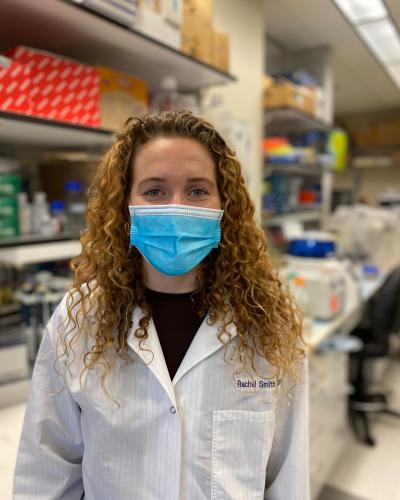Rachel Smith is a postbac in the Physiology Unit of the Laboratory of Malaria and Vector Research (LMVR) where she works under the supervision of Hans Ackerman, M.D., D.Phil., M.Sc. Rachel reflects on her postbac experience at NIAID—from overcoming the challenges posed by the COVID-19 pandemic to her excitement for her next steps.
Tell me about your research and how it contributes to the mission of the lab.
The Physiology Unit of LMVR, led by Hans Ackerman, M.D., D.Phil., M.Sc, investigates the molecular mechanisms regulating blood flow in diseases such as malaria and sickle cell anemia. My contribution to this goal has been multifaceted. Pre-COVID, my primary focus was to conduct basic research characterizing the expression and interactions of proteins responsible for the dilation of human blood vessels. When the COVID-19 pandemic hit, I used the first two months to characterize the host transcriptomic response to Babesia rossi parasite infection in canines, a disease that clinically resembles severe malaria in humans. To do this, I analyzed RNA-seq data extracted from whole blood samples that had been sequenced prior to the research pause. In May, I was able to return to campus and contribute to our lab’s COVID-19 project investigating how angiotensin-converting enzyme 2 (ACE2) expression—identified as the SARS-CoV-2 binding site—is affected by blood pressure-regulating drugs in organs most prone to COVID complications using a mouse model system.
How did you remain productive while working outside of the lab?
There are always new skills to learn, classes to take, and papers to read! With the support of Dr. Ackerman, I was able to further expand my computational skillset by taking a Python course through the Foundation for Advanced Education in the Sciences (FAES) and earning a certificate in data science through Johns Hopkins University. Pursuing individual training in data science was personally rewarding and very helpful in my current research projects.
How have you remained focused and motivated to apply for graduate school?
I think it’s really easy to get lost in the drudge of application season and even easier to be overwhelmed by imposter syndrome and general self-doubt during this time. For me, it always helped to take a step back and remember why I wanted to apply to graduate school in the first place—all of the exciting questions I want to explore in my future research! I also think it’s useful to talk to other postbacs going through the same process to realize that these feelings are ubiquitous, and of course to friends and family outside of work for perspective.
How has your postbac prepared you for your future career?
My postbac experience has exposed me to a world of research, collaboration, and endless scientific resources. Ultimately, it confirmed and expanded my excitement for the possibility of scientific discovery. I plan to pursue a career as an academic neuroscientist, conducting computational psychiatry research to expand our knowledge of the neurobiological effects of acute, chronic, and intergenerational trauma.


